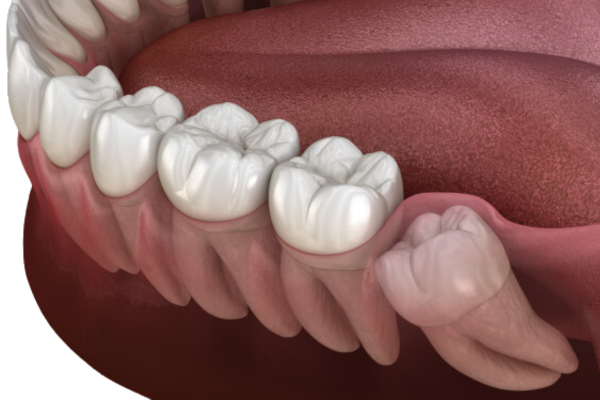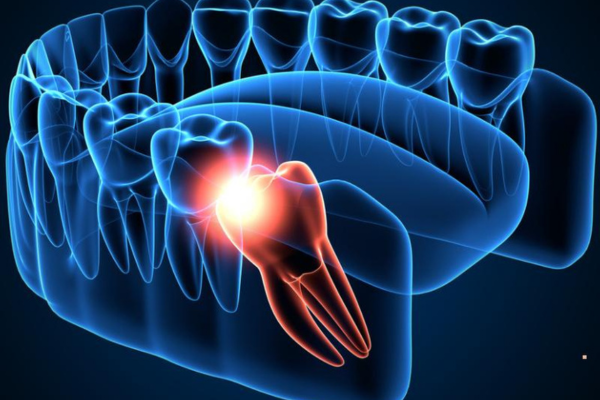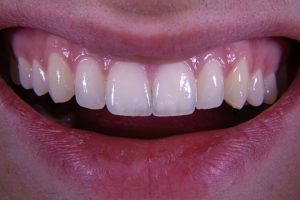Wisdom teeth can be a source of a lot of pain and discomfort for individuals. Annoying soreness, along with an inability to enjoy your favorite food, is a given with any wisdom tooth. But can wisdom teeth cause headaches, too?
As enigmatic as they are notorious, wisdom teeth have been associated with various discomforts, and the question that arises is whether they can be the undetected source of headaches in people.
Read on to discover the potential connection between wisdom teeth and headaches and whether these molars can be the culprits behind those pesky migraines.
Table of Contents
So, Can Wisdom Teeth Cause Headaches?
Your wisdom teeth are your third set of molars located at the very back of your mouth. They usually appear between the ages of 17 and 25. Most people have four wisdom teeth – two on the upper jaw and two on the lower jaw.
So, can wisdom teeth cause headaches?
Yes, they can!
Emerging Wisdom Teeth
The American Dental Association (ADA) says wisdom teeth begin to move through a person’s jawbone and eventually break through the gumline about five years after your second set of molars comes in. This movement of new teeth coming in can lead to discomfort and pain, including headaches.
Impacted Wisdom Tooth
An impacted wisdom tooth is a condition in which the third molars, commonly known as wisdom teeth, fail to fully emerge or erupt into their normal position in the mouth. Due to limited space in the jaw or improper angle of growth, the wisdom tooth does not get enough room to grow properly, causing it to become impacted and:
- Emerge at an angle
- Push against the other molars at the back of your mouth
- Get stuck in your jaw
When wisdom teeth grow in a confined oral space, insufficient room may lead to the displacement of adjacent teeth, resulting in an irregular bite. This misalignment can prompt the lower jaw to adjust, potentially causing discomfort and soreness, including headaches.
10 Signs That Your Wisdom Tooth Might be the Cause of Your Headache

Most people don’t tend to think about their wisdom teeth until they begin to experience pain. In fact, many of them don’t realize that wisdom teeth can cause very real headaches.
If you have been experiencing regular headaches and can’t pinpoint the source, it may be time to take a closer look at your wisdom tooth.
Here is our list of ten signs that could indicate that a wisdom tooth might be the cause of your headache.
Severe Migraines
Migraines with unidentifiable causes could be linked to the pressure in the jawbone created by an impacted wisdom tooth.
Tension Headaches
You could also be experiencing tension headaches due to tightness in your face, head, and neck, which is likely a result of the imbalance caused by your wisdom tooth pushing against other teeth.
Sinus Headaches
If you are experiencing a sinus headache, it could be due to pressure and inflammation around your wisdom tooth. The pain from this headache might be an intense throbbing kind, normally accompanied by a stuffy nose and sore throat.
Headaches Combined with Earaches
Ear pain, accompanied by a headache caused by the pressure and tension in your jawbone by your erupting wisdom tooth, could also indicate your wisdom tooth being the culprit for the discomfort.
Headaches that Worsen Upon Biting
If your headache worsens when you bite down, this could be a sign that your wisdom tooth is causing pressure in your jawbone and surrounding tissue.
Head Pain on the Wisdom Tooth Eruption Side
Discomfort in this region is probably a result of the pressure exerted by wisdom teeth against surrounding areas of the mouth, like the cheekbone, causing a headache.
Soreness in Jaw Accompanied with Headache
Tenderness in the jaw accompanied by a headache can be a symptom caused by the pressure your wisdom tooth exerts by pushing against the other parts of your mouth.
Pain When Opening Your Mouth Wide
Another sign that your wisdom teeth might be causing you a headache is the pain that occurs when you open your mouth wide. It can become quite challenging to open your mouth wide as the pressure from the wisdom tooth increases. This could be either due to a jawbone misalignment or from the pressure of an erupting tooth.
Headache While Eating Hot & Cold Items
Inflammation in the area around the wisdom tooth can cause temperature sensitivity, leading to sharp pain radiating to the top of your head while eating hot and cold food items.
Swollen Gums Accompanied with Headaches
Swollen, red gums that are hot to the touch and accompanied by headaches could indicate an infected wisdom tooth. An abscessed wisdom tooth could be the cause of horrible pain and swelling that could radiate throughout your skull.
Other Problems Caused by Wisdom Teeth

In addition to headaches accompanied by multiple other pains, wisdom teeth can lead to a variety of other issues, including, but not limited to:
- Swelling of the gum line at the back of your mouth
- Misalignment of teeth in your oral cavity
- Cyst formation
- Tumors
- Tooth decay
- Gum disease
- TMJ disorder
- Halitosis
- Damage and destruction to neighboring teeth
When Does a Wisdom Tooth Extraction Become Necessary?
If your wisdom teeth are in healthy condition and are not affecting your surrounding teeth, it is perfectly acceptable to keep them. However, there are some instances wherein a wisdom tooth extraction becomes necessary to keep your oral cavity healthy and functioning.
A wisdom tooth extraction will be required when:
- There is insufficient space in your mouth for them to grow
- Your wisdom tooth has become trapped in your jawbone or gum
- There are cavities on your wisdom tooth
- Your wisdom tooth has become infected beyond repair
- The wisdom tooth is causing damage to nearby teeth
How to Manage Headaches & Pain Caused by a Wisdom Tooth

Over-the-Counter Pain Relief: Pain medications such as acetaminophen (Tylenol) or ibuprofen (Advil, Motrin) are effective in managing pain and reducing inflammation.
Cold & Hot Compression: Apply a cold or hot compress to the external area of the wisdom tooth site. This method can effectively diminish swelling and provide a numbing effect for pain relief.
Saltwater Rinsing: Reduce inflammation and support healing by gargling with warm saltwater. Mix half a teaspoon of salt in a glass of warm water and rinse gently multiple times a day.
Maintain Optimal Oral Hygiene: Safeguard the region around your wisdom teeth by practicing gentle brushing and flossing. Consistent oral hygiene is crucial for preventing further irritation and lowering the risk of infection.
Hydration Support: Ensure adequate water intake to stay hydrated, fostering overall comfort and aiding in the healing process.
Head Elevation: Elevate your head while sleeping by using an additional pillow. This elevation can minimize blood flow to the head, offering relief from pressure and pain.
Seek Professional Guidance: Consult with a dentist or oral surgeon for a comprehensive assessment of your wisdom teeth condition, as they can help you understand better the course of treatment required for your particular case.
Conclusion
Now that you know the answer to the question, “Can wisdom teeth cause headaches?” you can be more careful when noticing symptoms and spotting the signs. Visiting a dentist is the only way to get advice that is tailored to your specific situation. Do your best to get immediate medical attention in case you experience severe pain, swelling, or infection.
Find out more about how to treat a wisdom tooth at Brooklyn Blvd. Dental. Call 763-533-8669 or contact us at frontdesk1@brooklynblvddental.com.
FAQs
How do you know if you have a headache from your teeth?
Some common signs that indicate a headache that stems from a dental problem include:
- Experiencing a sore jaw
- Constant popping of jaw joints
- A sensation of pain and pressure behind the eyes
What do wisdom teeth headaches feel like?
Headaches caused by wisdom teeth commonly manifest as a persistent, achy sensation in the rear of the mouth, jaw, or temples, with a range of intensity spanning from mild discomfort to intense, throbbing pain.
Can the removal of a wisdom tooth help with the headaches?
If your symptoms with regard to a wisdom tooth eruption are severe, your dentist might recommend an extraction, which can help ease the headaches and other related issues that accompany an impacted wisdom tooth.
How long does it take to recover from a wisdom tooth extraction?
The healing period after a wisdom tooth extraction is typically three to four days, but for some patients, it can also take up to seven days to heal completely.








